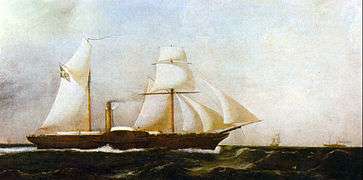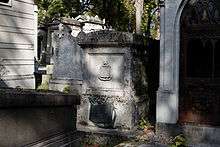John Pascoe Grenfell
| John Pascoe Grenfell | |
|---|---|
 Admiral John Pascoe Grenfell | |
| Born |
20 September 1800 Battersea, Kingdom of Great Britain |
| Died |
20 March 1869 Liverpool, United Kingdom of Great Britain and Ireland |
| Allegiance |
|
| Service/branch |
|
| Rank | Admiral |
| Battles/wars |
Independence of Brazil Cisplatine War Ragamuffin War Platine War |
| Other work | Diplomat |
John Pascoe Grenfell (20 September 1800 – 20 March 1869) was a British born officer and diplomat of the Empire of Brazil. He spent most of his service in South America campaigns, most notably under the leadership of Lord Cochrane and Commodore Norton. He was the nephew of British politician Pascoe Grenfell and grandfather to General Sir John Grenfell Maxwell. He was a knight grand cross of the Imperial Order of the Rose and a knight of the Imperial Order of the Southern Cross.[1]
Personal history
Early history
John Pascoe Grenfell was born on 20 September 1800 to John Maugham Grenfell and his wife Sophia Turner.[2] In 1811 he entered the service of the British East India Company, and in 1819 he joined the Chilean republic under Lord Cochrane. He took part in most of the conflicts undertaken by Lord Cochrane during the War of Chilean Independence, and rose to the rank of lieutenant. On 5 November 1820 Grenfell was injured in the cutting of the Esmeralda the last major Spanish warship in the South Pacific. In 1823 now holding the rank of commander he followed Lord Cochrane to Brazil, to fight in the Brazilian War of Independence. In August 1823, Grenfell in command of the small brig Dom Miguel sailed to Pará and using a similar tactic used by Lord Cochrane at Maranham, forced the surrender of the junta governativa by making them think a larger fleet was following.[3] On 29 July 1826, under the command of Commodore Norton, he lost his arm in the Cisplatine War. He then returned to England to recuperate.
Later life

In 1828 Grenfell returned to Brazil, and during 1835–36 he commanded a squadron of ships on the lakes of Rio Grande do Sul against rebel flotillas. He was successful in defeating his opponents which forced the surrender of the rebel army. In 1841 he was promoted to rear-admiral and in 1846 was consul general in England and he returned to Britain to live in Liverpool. In 1848 when supervising the Brazilian warship Dom Afonso he was involved in the rescuing of passengers from the Ocean Monarch off the coast of England.[4]
In 1851 war broke out between Brazil and Argentina and he was posted to Brazil to take control of their Navy. In December of that year he successfully forced the passage of the Paraná River. After the conflict ended he was promoted to vice-admiral and then finally admiral. He again returned to Liverpool to resume his role as consul-general and remained there until his death in 1869.
Family

Grenfell married Maria Dolores Masini. They had eight children; John Granville (1829–1866), Maria Dolores (1831–?), Sophia (1833–1898),[5] Maria Emma(1833–?), Alfred (1839–?), Flora (1841–1874), Harry Tremenheere (1845–1906) and Thomas Cochrane (1847–49).[6]
Honors
Non-titled nobility honors
- Grand Cross of Brazilian Order of the Rose.[7]
- Officer of the Brazilian Order of the Southern Cross.[7]
Military honors
- Medal (oval) of the Independence War (Bahia).[7]
- Medal (gold; blue ribbon) for the Battle of The Tonelero Pass.[7]
References
- ↑ Stewart, Charles Samuel, Brazil and La Plata, the personal record of a cruise, p. 335
- ↑ "Col. Harold Maxwell GRENFELL, CMG MVO, b: 1870 – Taplow, England". grenfell.history.users.btopenworld.com. Retrieved 15 June 2012.
- ↑ Encyclopædia Britannica 11th Edition.
- ↑ The Illustrated London News, 2 September 1848
- ↑ I8603: Sophia Grenfell ( – 19 August 1898)
- ↑ "Deaths January 1849". Liverpool Journal. 20 January 1849.
- 1 2 3 4 Haring 1869, p. 163.
Bibliography
- Haring, Carlos Guilherme (1869). Almanak Administrativo, Mercantil e Industrial (Almanaque Laemmert) (in Portuguese). Rio de Janeiro, Rio de Janeiro: Eduardo & Henrique Laemmert.
- Morais, Eugênio Vilhena (2003). O Duque de Ferro: novos aspectos da figura de Caxias (in Portuguese). Rio de Janeiro, Rio de Janeiro: Biblioteca do Exército. ISBN 978-85-7011-329-0.
- Rodrigues, José Honório (1975). Independência: revolução e contra-revolução (in Portuguese). 3. Rio de Janeiro, Rio de Janeiro: Livraria Francisco Alves Editora.
- Vale, Brian. * "A War Betwixt Englishmen Brazil Against Argentina on the River Plate 1825-1830", I. B. Tauris.
External links
![]() Media related to John Pascoe Grenfell at Wikimedia Commons
Media related to John Pascoe Grenfell at Wikimedia Commons
.svg.png)